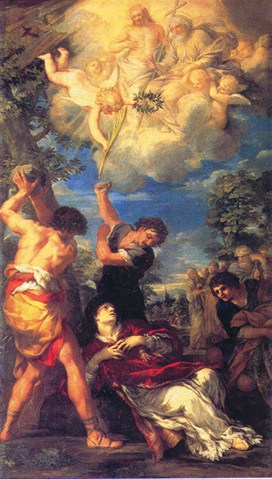He – John the Baptist, that is – got beheaded for a party. Just goes to show, it’s not good to be invited to those sorts of parties.
I wonder how mandatory Salome’s presence was. Was she there by choice, or because she didn’t dare not be? I wonder how many beheadings Salome had seen, given her nonchalance (at least, Scriptures doesn’t, so far as I know, mention that she went into a private room to barf), perhaps quite a few, but you know, maybe that particular head was the one that changed her life for a different road than the one she was going down. Wasn’t her mother the one who had a grudge against John, not Salome? Can only hope. She might not have cared either way. I wonder what Herodias did with it. I wonder if Salome ever danced again.
I hear about the Baptist’s beheading, and there’s always these up-tight Catholics who dissect the whole hilarity as though its participants were frogs. As though Salome was a lewd little chit, and perhaps she was. But the Herodians never sounded like a particularly healthy family. I wonder if King Herod abused Salome. I wonder if she performed that dance, lewd or not, as a sort of insurance against being beaten the next day, or worse.
I wonder if she would have gone to her mother to ask for advice if she had known what her mother would tell her to ask for.
I wonder if she made the request because she hated John the Baptist, or was terrified of her mother.
Given the likelihood that domestic violence existed in Salome’s narrow little world, I’d bank on the latter.
Salome’s been dust in her grave for two thousand years. Seems like a long time to keep on looking down on a girl, even a silly or evil one, and I doubt she was either. What Salome was, most likely, was a survivor in a frightening, perpetually dark world of enemies, trapped in a palace she would never escape, because where would she go? Girls like her, if they refused to perform in palaces, performed in the streets. She lived in a time when it wasn’t uncommon for parents to sell their children into slavery. As a girl, she was worthless to King Herod, except for her entertainment value, and she knew it.
John the Baptist wasn’t a guy to mince his language, but it would surprise me if he had a harsh word for Salome. I wonder if instead he performed one last mighty deed, after the line of the old prophets who could call down fire from heaven. But it was a secret miracle, hidden away like an execution in a prison. But I wonder if the Baptist’s head on a platter was the price of Salome’s freedom. We’ll never know, but if it was, I wouldn’t be surprised if he paid it gladly.
He was laughing, you know, when he saw the executioner step into his cell, sword in hand.
Heads on platters are funny, especially from the platter-view.










